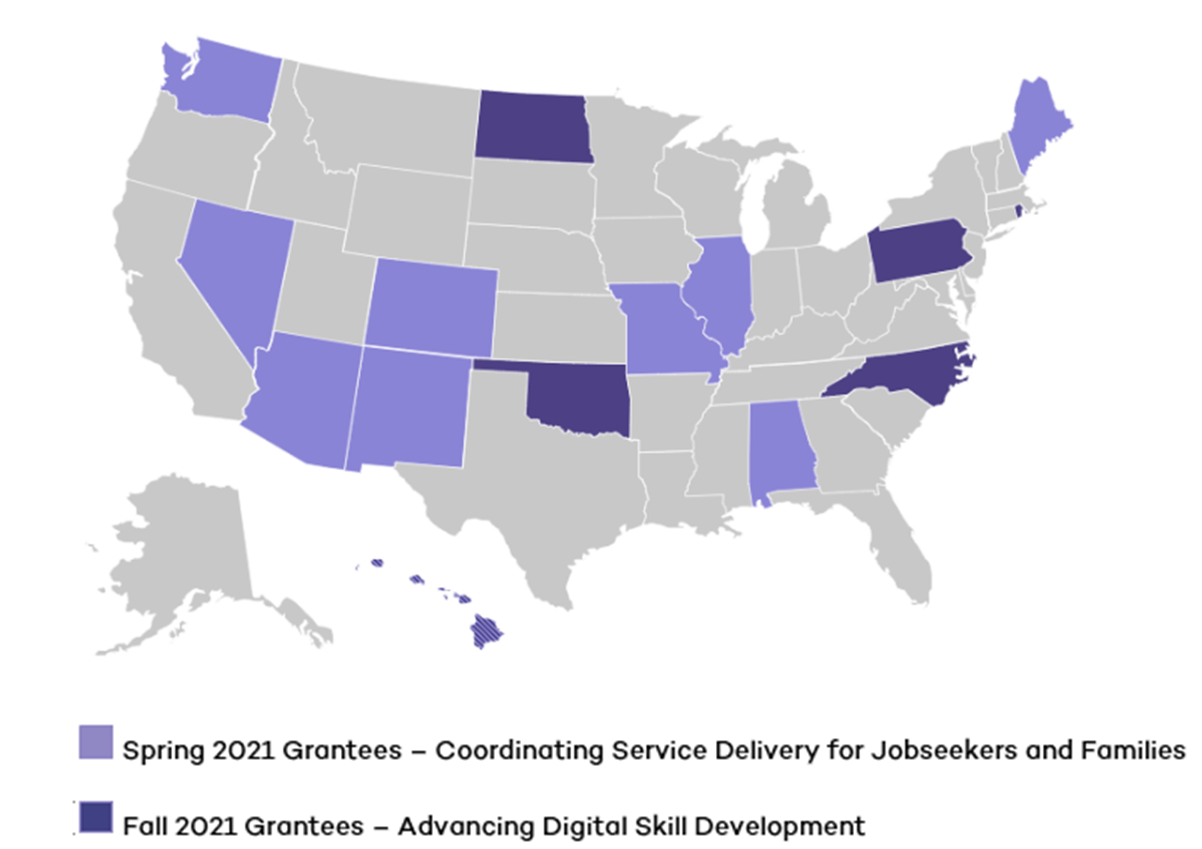Hawai’i, North Carolina, North Dakota, Oklahoma, Pennsylvania and Rhode Island brought together interagency teams to develop state plans to close digital skills gaps in priority industries, geographies and demographics in alignment with their Governors’ workforce and economic development priorities.
By Jordan Morang and Sophia Yager
The rapid digitization of the economy catalyzed by the COVID-19 pandemic has laid bare the digital divide between those who have access to broadband, connected devices and digital skills to successfully navigate this transformation and those who do not. Governors across the country have prioritized digital equity to adapt to these changes and improve outcomes for individuals and families, driving state efforts across an array of policy areas including workforce development, infrastructure, K-12 education, postsecondary education and health care. For workers and jobseekers, these trends have surfaced gaps between employers’ digital skills needs and workers’ digital literacy and skills competencies, creating challenges in accessing and succeeding in high-quality jobs that support thriving state economies.

In January 2021, the NGA Center for Best Practices launched the NGA Workforce Innovation Network (NGA WIN) to build state capacity for innovation and help states prepare their workforces for a post-COVID-19 economy. In November 2021, six states were selected to participate in the second cohort of NGA WIN, focused on advancing digital skill development for equitable economic participation. Hawai’i, North Carolina, North Dakota, Oklahoma, Pennsylvania and Rhode Island brought together interagency teams to develop state plans to close digital skills gaps in priority industries, geographies and demographics in alignment with their Governors’ workforce and economic development priorities.
To share insights from the cases studies of these six states, NGA WIN recently released Lessons Learned in Workforce Innovation: How Six States Are Planning to Advance Digital Skills for Equitable Economic Participation. The publication includes a framework for Governors and state policymakers to assess their state’s needs and capacity for digital skill development as well as information on key elements of state action plans to boost digital skills access and attainment. To inform these plans, states may undertake a wide array of planning efforts, such as mapping digital skills assets, collecting data and engaging stakeholders, to capture a comprehensive picture of the digital skills landscape. States can then leverage this information to build data-driven plans that include strategies and policy recommendations to align state initiatives and increase workers’ digital skills. Comprehensive plans may include elements that address access and equity, partner alignment, data collection, training opportunities, digital navigation and resource allocation.
Recent federal investments in digital equity through the Infrastructure Investment and Jobs Act (IIJA) present states with additional opportunities to define their goals and expand their capacity to advance digital skills. The Digital Equity Act (DEA) and the Broadband Equity, Access, and Deployment (BEAD) program, two provisions of IIJA, offer a historic level funding to plan and implement programs that provide equitable access to high-speed internet along with the training necessary to fully utilize that connectivity. As states are developing plans to close digital skills gaps, they can work to align with DEA and BEAD planning efforts by connecting with teams leading that work to avoid duplication and ensure greater collective impact for all three plans (in many states, DEA and BEAD planning efforts are led by the state’s broadband office). States can also leverage and expand their stakeholder engagement efforts on digital skills to both fulfill requirements of the DEA and BEAD programs and to infuse diverse perspectives into their broader digital skills plans. Doing so can help the state design an inclusive and holistic approach that truly meets the most pressing needs of their residents. As states identify metrics to measure progress toward increased digital skills, they may also consider aligning these goals with their DEA and BEAD objectives to coordinate partners in implementing strategies that achieve those goals as well as ensure efforts are sustainable and advance digital skills beyond the limited timeframe of DEA and BEAD.
About the NGA Workforce Innovation Network: The National Governors Association Workforce Innovation Network (NGA WIN) is a nonpartisan learning and action collaborative for state leaders who have demonstrated strong commitments to developing a resilient workforce. The initiative is dedicated to building state capacity for near-term innovation and longer-term strategy development to prepare state workforces for a post-COVID-19 economy. NGA WIN was launched in January 2021 in partnership with its founding sponsor, the Cognizant Foundation, and since has received support from Intel, Microsoft, Walmart and Western Governors University, in addition to engaging more than 20 national organizations as thought partners and advisors to the network. NGA WIN is an initiative of the NGA Center for Best Practices’ Workforce Development and Economic Policy Program. To learn more, please contact workforcedevelopment@nga.org












